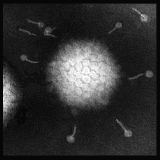 There are at least 52 immunologically distinct serotypes of adenoviruses that can cause human infections. Adenoviruses are unusually stable to chemical and physical agents and to varied pH, thus allowing for prolonged survival outside of the body.
There are at least 52 immunologically distinct serotypes of adenoviruses that can cause human infections. Adenoviruses are unusually stable to chemical and physical agents and to varied pH, thus allowing for prolonged survival outside of the body.
In the United States, adenovirus serotypes 4 and 7 most commonly cause respiratory illness. Adenoviruses are transmitted by respiratory droplets, fecal-oral transmission, and, occasionally, through contact with contaminated objects or water. Some adenovirus serotypes can establish persistent asymptomatic infections in tonsils, adenoids, and intestines of infected people who can shed these viruses for months or years. In military enlisted training centers, adenoviruses have historically caused substantial and prolonged outbreaks of respiratory illness. Find more information on Respiratory Infections Surveillance Activities.
Adenoviruses most commonly cause respiratory illness. However, depending on the infecting serotype, adenoviruses may also cause conjunctivitis, gastroenteritis, cystitis, and, less commonly, neurologic illness. Respiratory illness symptoms caused by adenovirus infection range from common cold symptoms, pharyngitis, and rhinitis, to bronchitis or pneumonia. Young infants and patients with compromised immune systems are more susceptible to severe complications from adenovirus infection.
Adenovirus vaccines are live-virus vaccines approved for one-time use in new military members, ages 17 to 50 years. The vaccines are administered orally, as a single dose of two enteric-coated tablets; one tablet protects against adenovirus serotype 4 (white tablet) and one tablet protects against adenovirus serotype 7 (peach-colored tablet). Each tablet must be swallowed whole and cannot be chewed or crushed. The most common adverse events after adenovirus vaccine receipt are headaches, stuffy nose, sore throat, joint pain, abdominal pain, cough, nausea, diarrhea, or fever.
You will find below all of the resources you will need about the adenovirus vaccine. More will be added as they are published or released.